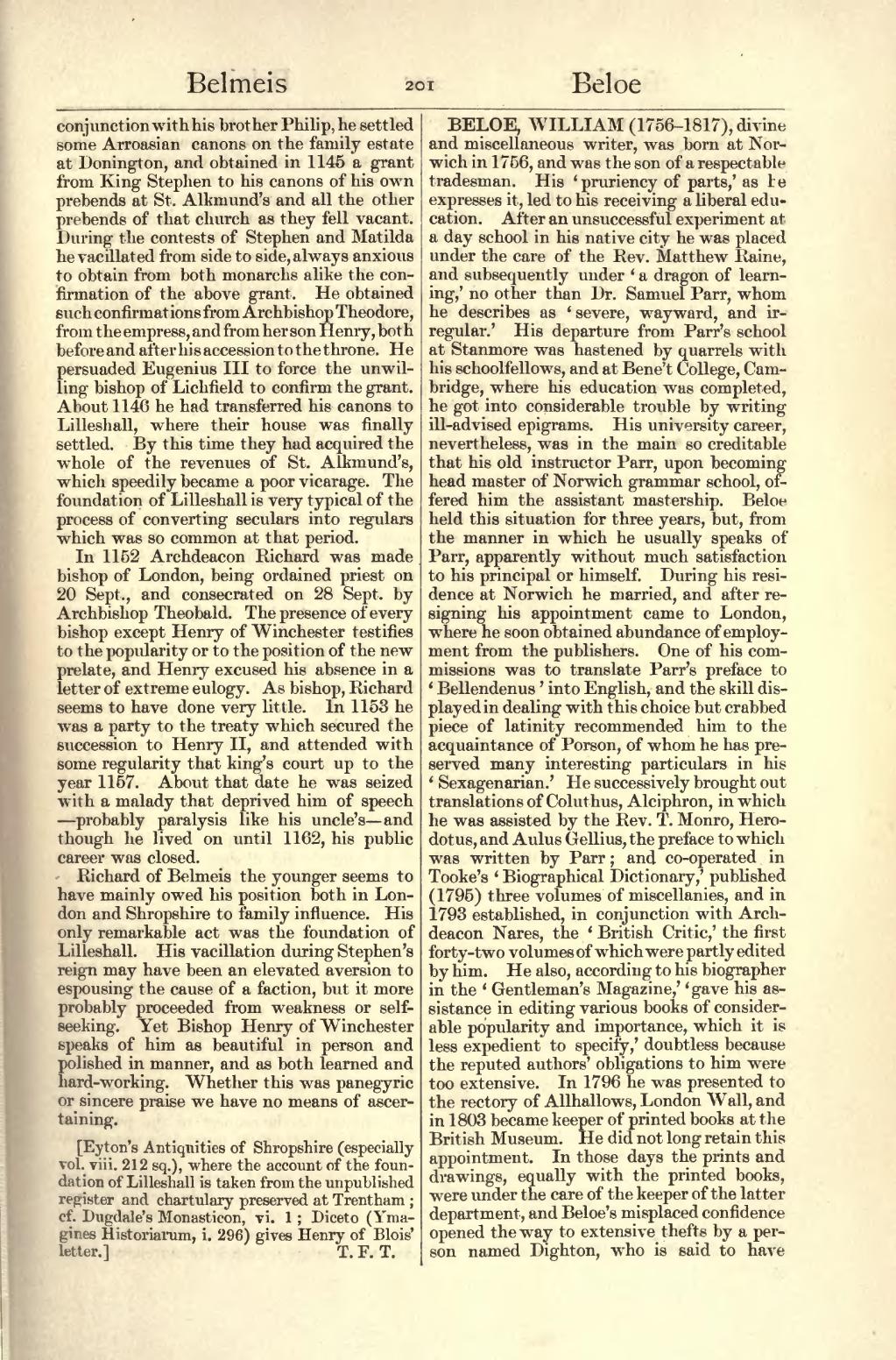conjunction with his brother Philip, he settled some Arroasian canons on the family estate at Donington, and obtained in 1145 a grant from King Stephen to his canons of his own prebends at St. Alkmund's and all the other prebends of that church as they fell vacant. During the contests of Stephen and Matilda he vacillated from side to side, always anxious to obtain from both monarchs alike the confirmation of the above grant. He obtained such confirmations from Archbishop Theodore, from the empress, and from her son Henry, both before and after his accession to the throne. He persuaded Eugenius III to force the unwilling bishop of Lichfield to confirm the grant. About 1146 he had transferred his canons to Lilleshall, where their house was finally settled. By this time they had acquired the whole of the revenues of St. Alkmund's, which speedily became a poor vicarage. The foundation of Lilleshall is very typical of the process of converting seculars into regulars which was so common at that period.
In 1152 Archdeacon Richard was made bishop of London, being ordained priest on 20 Sept., and consecrated on 28 Sept. by Archbishop Theobald. The presence of every bishop except Henry of Winchester testifies to the popularity or to the position of the new prelate, and Henry excused his absence in a letter of extreme eulogy. As bishop, Richard seems to have done very little. In 1153 he was a party to the treaty which secured the succession to Henry II, and attended with some regularity that king's court up to the year 1157. About that date he was seized with a malady that deprived him of speech—probably paralysis like his uncle's—and though he lived on until 1162, his public career was closed.
Richard of Belmeis the younger seems to have mainly owed his position both in London and Shropshire to family influence. His only remarkable act was the foundation of Lilleshall. His vacillation during Stephen's reign may have been an elevated aversion to espousing the cause of a faction, but it more probably proceeded from weakness or self-seeking. Yet Bishop Henry of Winchester speaks of him as beautiful in person and polished in manner, and as both learned and hard-working. Whether this was panegyric or sincere praise we have no means of ascertaining.
[Eyton's Antiquities of Shropshire (especially vol. viii. 212 sq.), where the account of the foundation of Lilleshall is taken from the unpublished register and chartulary preserved at Trentham ; cf. Dugdale's Monasticon, vi. 1; Diceto (Ymagines Historiarum, i. 296) gives Henry of Blois' letter]
BELOE, WILLIAM (1756–1817), divine and miscellaneous writer, was born at Norwich in 1756, and was the son of a respectable tradesman. His ‘pruriency of parts,’ as he expresses it, led to his receiving a liberal education. After an unsuccessful experiment at a day school in his native city he was placed under the care of the Rev. Matthew Raine, and subsequently under ‘a dragon of learning,’ no other than Dr. Samuel Parr, whom he describes as ‘severe, wayward, and irregular.’ His departure from Parr's school at Stanmore was hastened by quarrels with his schoolfellows, and at Bene't College, Cambridge, where his education was completed, he got into considerable trouble by writing ill-advised epigrams. His university career, nevertheless, was in the main so creditable that his old instructor Parr, upon becoming head master of Norwich grammar school, offered him the assistant mastership. Beloe held this situation for three years, but, from the manner in which he usually speaks of Parr, apparently without much satisfaction to his principal or himself. During his residence at Norwich he married, and after resigning his appointment came to London, where he soon obtained abundance of employment from the publishers. One of his commissions was to translate Parr's preface to ‘Bellendenus’ into English, and the skill displayed in dealing with this choice but crabbed piece of latinity recommended him to the acquaintance of Porson, of whom he has preserved many interesting particulars in his ‘Sexagenarian.’ He successively brought out translations of Coluthus, Alciphron, in which he was assisted by the Rev. T. Monro, Herodotus, and Aulus Gellius, the preface to which was written by Parr; and co-operated in Tooke's ‘Biographical Dictionary,’ published (1795) three volumes of miscellanies, and in 1793 established, in conjunction with Archdeacon Nares, the ‘British Critic,’ the first forty-two volumes of which were partly edited by him. He also, according to his biographer in the ‘Gentleman's Magazine,’ ‘gave his assistance in editing various books of considerable popularity and importance, which it is less expedient to specify,’ doubtless because the reputed authors' obligations to him were too extensive. In 1796 he was presented to the rectory of Allhallows, London Wall, and in 1803 became keeper of printed books at the British Museum. He did not long retain this appointment. In those days the prints and drawings, equally with the printed books, were under the care of the keeper of the latter department, and Beloe's misplaced confidence opened the way to extensive thefts by a person named Dighton, who is said to have

